-
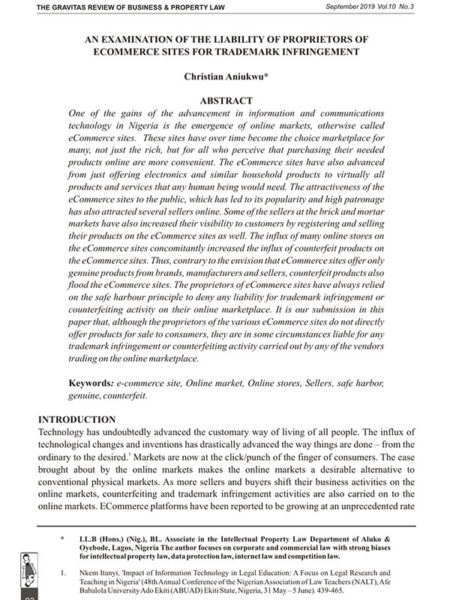
An Examination of the Liability of Proprietors of E-Commerce Sites for Trademark Infringement
0₦2,500.00Christian Aniukwu of Aluko and Oyebode, in his article An Examination of the Liability of Proprietors of Ecommerce Sites for Trademark Infringement, reflects on the emergence of eCommerce, including its convenience and attractiveness, but points to the likelihood of trademark infringement on eCommerce sites which may go without any liability due to the difficulty in tracing perpetrators. He argues that the proprietors of eCommerce sites in some circumstances should be held responsible for trademark infringement on their sites rather than being allowed to avoid liability under the safe habour principle. He discusses practical steps that may be employed in fighting online counterfeiting of brands.
-
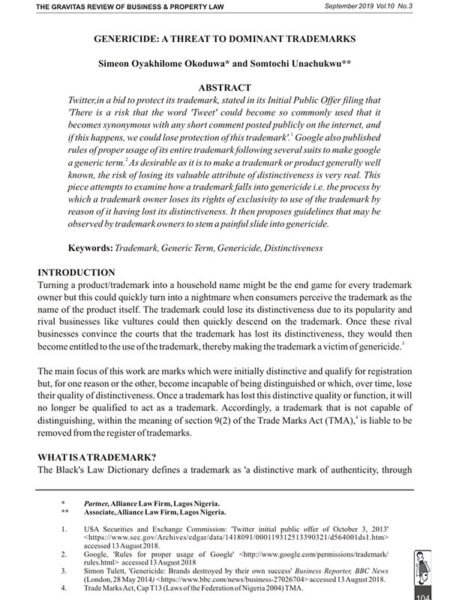
Genericide: A Threat to Dominant Trademarks
0₦2,500.00Simeon Okoduwa and Somtochi Unachukwu of Alliance Law Firm, Lagos Nigeria in their article, Genericide: A Threat to Dominant Trademarks, discuss the generification of trademarks as a result of the loss of distinctiveness. They suggest insightful guidelines that may be observed by trademark owners to stem a painful slide into genericide.
-
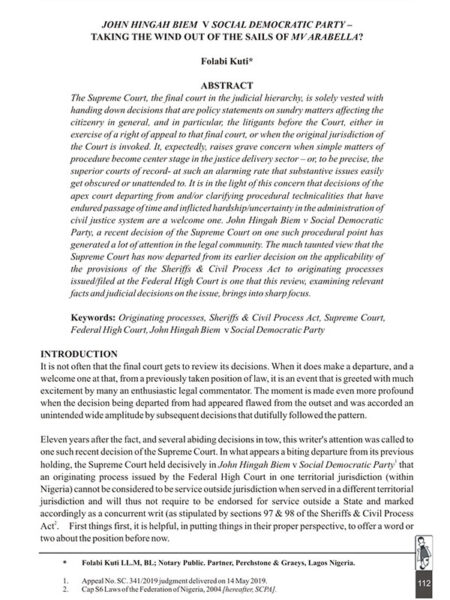
John Hingah Biem v Social Democratic Party – Taking the Wind Out of the Sails of MV Arabella?
0₦2,500.00Folabi Kuti, Partner, Perchstone & Graeys Lagos Nigeria in John Hingah Biem v Social Democratic Party – Taking the winds out of the sails of Arabella? analyses the recent decision of the Supreme Court in John Biem. He considers whether the apex court has indeed departed from its earlier decision in MV Arabella on the applicability of the provisions of the Sheriffs & Civil Process Act to originating processes issued/filed at the Federal High Court.
-
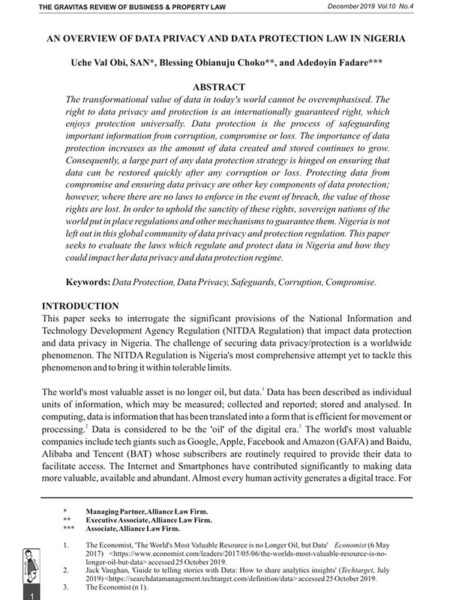
An Overview of Data Privacy and Data Protection Law in Nigeria
0₦2,500.00Uche Val Obi SAN, Blessing Choko and Adedoyin Fadare posit that the right to data privacy and protection is now an internationally guaranteed right and nations of the world, including Nigeria, put in place regulations and other mechanisms to safeguard data from corruption, compromise or loss. Uche Obi et al. comprehensively review Nigerian laws and regulations dealing with data protection and privacy, including the Nigeria Data Protection Regulation 2019 against the backdrop of international best practices.
-
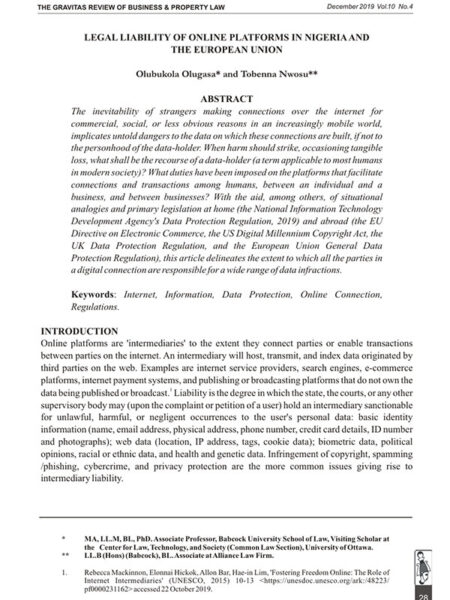
Legal Liability of Online Platforms in Nigeria and the European Union
0₦2,500.00Dr Olubukola Olugasa, Associate Professor of Law at Babcock University, and Tobenna Nwosu in their article, Legal Liability of Online Platforms in Nigeria and the European Union, review the liability of hosting platforms for breach of data privacy and losses arising therefrom. They examine Nigeria’s legal regime on data protection and the EU Directive on Electronic Commerce, the US Digital Millennium Copyright Act, the UK Data Protection Regulation, and the European Union General Data Protection Regulation. The authors delineate the extent to which all the parties in a digital connection are responsible for a wide range of data infractions.
-
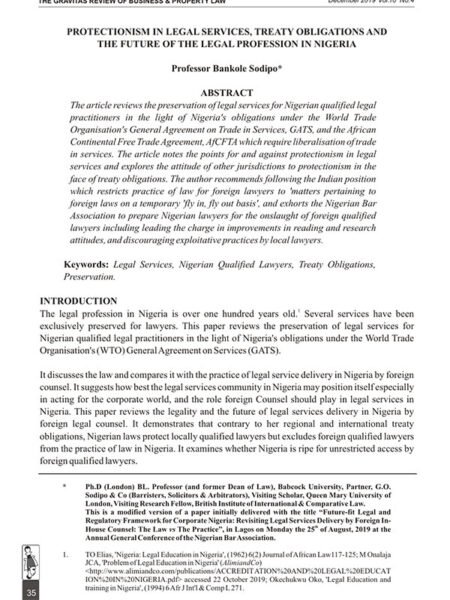
Protectionism in Legal Services, Treaty Obligations, and the Future of the Legal Profession in Nigeria
0₦2,500.00Professor Sodipo Bankole of Babcock University; Visiting Scholar, Queen Mary University of London and Partner GO Sodipo & Co in his article, Protectionism in Legal Services, Treaty Obligations and the Future of the Legal Profession in Nigeria, reviews the preservation of legal services for Nigerian qualified legal practitioners by the Legal Practitioners Act in the light of Nigeria’s obligations under the World Trade Organisation’s General Agreement on Trade in Services, GATS, and the African Continental Free Trade Agreement, AfCFTA, which require liberalisation of trade in services. He surmises that while the onslaught of foreign lawyers in Nigeria may only be a matter of time, Nigeria will do well to adopt the Indian position which restricts the practice of law for foreign lawyers to ‘matters pertaining to foreign laws on a temporary ‘fly in, fly out basis’. Professor Bankole exhorts the Nigerian Bar Association to prepare for the onslaught by leading the charge in improvements in reading and research attitudes and discouraging exploitative practices by local lawyers.
-
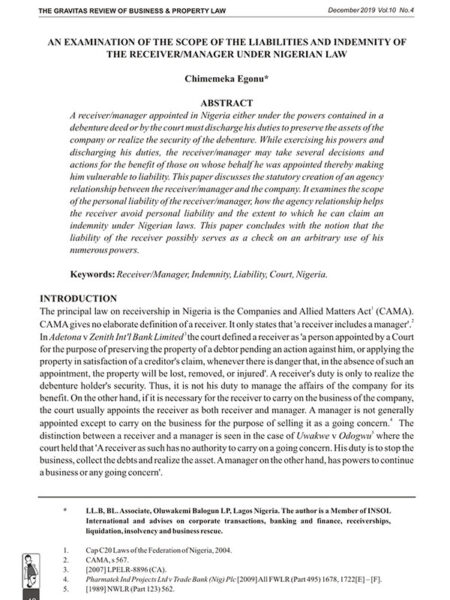
An Examination of the Scope of the Liabilities and Indemnity of the Receiver/Manager under Nigerian Law
0₦2,500.00While there are tomes of books and articles on the powers, appointment and duties of a Receiver, there is arguably scant literature on the extent and scope of the liabilities and indemnity of a Receiver in Nigeria. Chimemeka Egonu, Associate at Oluwakemi Balogun LP Lagos Nigeria, makes a brilliant effort to fill the gap in his article, An Examination of the Scope of the Liabilities and Indemnity of the Receiver/Manager Under Nigerian Law. He examines the scope of the personal liability of the Receiver/Manager in tort, contract, under the statutes and the extent to which he can claim indemnity under Nigerian law.
-
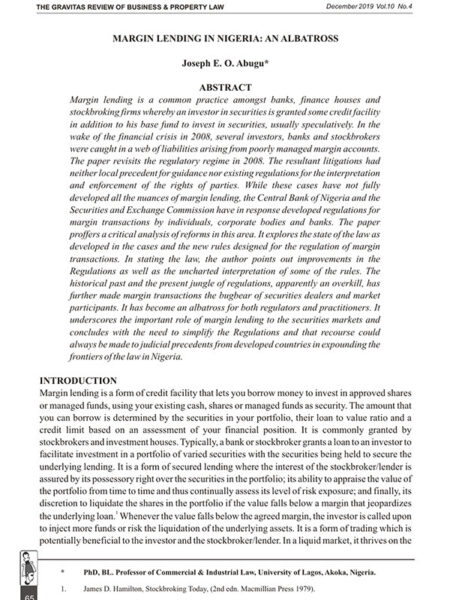
Margin Lending in Nigeria: An Albatross
0₦2,500.00Joseph Abugu, Professor of Commercial & Industrial Law, University of Lagos Akoka Nigeria in his article, Margin Lending in Nigeria: An Albatross, notes that Margin Lending is a common practice amongst banks, finance houses and stockbroking firms whereby an investor in securities is granted credit facility in addition to his base fund to invest in securities, usually speculatively. In the wake of the financial crisis of 2008, several investors, banks and stockbrokers were caught in a web of liabilities arising from poorly managed margin accounts. The resultant litigations had neither local precedent for guidance nor existing regulations for the interpretation and enforcement of rights. While the cases have not fully developed all the nuances of Margin Lending, the Central Bank of Nigeria and the Securities and Exchange Commission have in response developed regulations for margin transactions by individuals, corporate bodies and banks. Professor Abugu, in his usual inimitable style, explores the state of the law as developed in the cases and the new rules designed for the regulation of margin transactions.
-
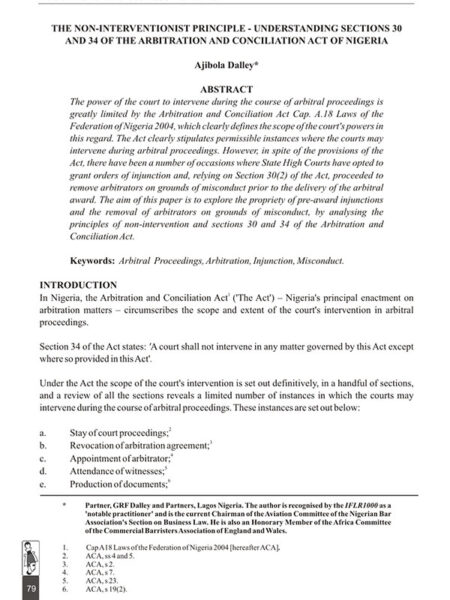
The Non-Interventionist Principle – Understanding Sections 30 and 34 of the Arbitration and Conciliation Act of Nigeria
0₦2,500.00Ajibola Dalley, Partner, GRF Dalley and Partners Lagos Nigeria in his article, The Non-Interventionist Principle – Understanding Sections 30 and 34 of the Arbitration and Conciliation Act of Nigeria, notes that though the power of the court to intervene during the course of an arbitral proceeding is limited by the Arbitration and Conciliation Act, some courts have granted orders of injunction and proceeded to remove arbitrators on grounds of misconduct prior to the delivery of the arbitral award. He explores the propriety of pre-award injunctions and the removal of arbitrators on the grounds of misconduct by analysing sections 30 and 34 of the ACA and other principles of non-intervention replete in the Act.
-
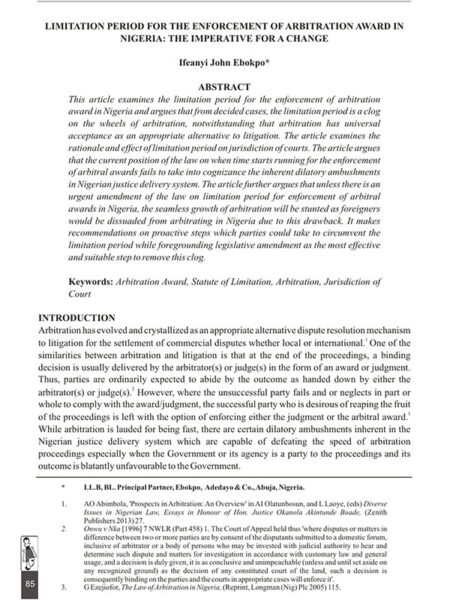
Limitation Period for the Enforcement of Arbitration Award in Nigeria: The Imperative for Change
0₦2,500.00Ifeanyi Ebokpo, Principal Partner, Ebokpo & Adedayo & Co Abuja Nigeria in his article,Limitation Period for the Enforcement of Arbitration Award in Nigeria: The Imperative for Change, examines the several modes and mechanisms for the recognition and enforcement of arbitral awards in Nigeria. He posits that the current position of the law on when time starts running for the enforcement of arbitral awards fails to take into cognizance the inherent dilatory processes in Nigerian justice delivery system. He advocates a change in the law so that the obvious drawback will not stunt the growth of arbitration.
-
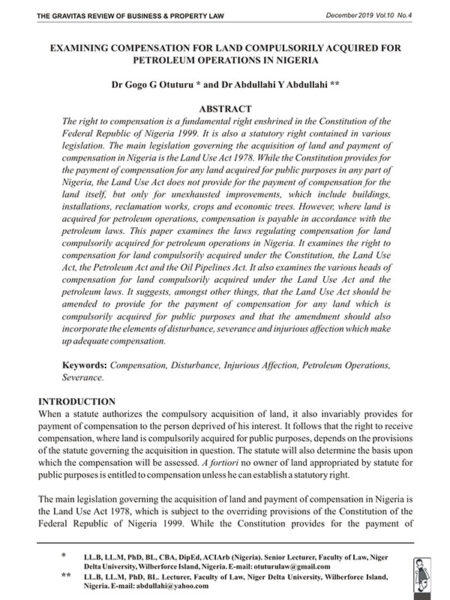
Examining Compensation for Land Compulsorily Acquired for Petroleum Operations in Nigeria
0₦2,500.00Dr Gogo Otuturu and Dr Abdullahi Abdullahi of the Faculty of Law, Niger Delta University, Wilberforce Island Nigeria in their article, note that the right to compensation for land compulsorily acquired is both a constitutional and statutory right. While the Constitution provides for the payment of compensation for any land acquired for public purposes, the Land Use Act provides for compensation, not for the land itself, but for unexhausted improvements. Where the land is acquired for petroleum operations, compensation is payable in accordance with the Petroleum Act and the Oil Pipelines Act. Otuturu and Abdullahi examine the various heads of compensation for land compulsorily acquired under the Land Use Act and the petroleum . They suggest an amendment of the laws to incorporate the elements of disturbance, severance and injurious affection.
-
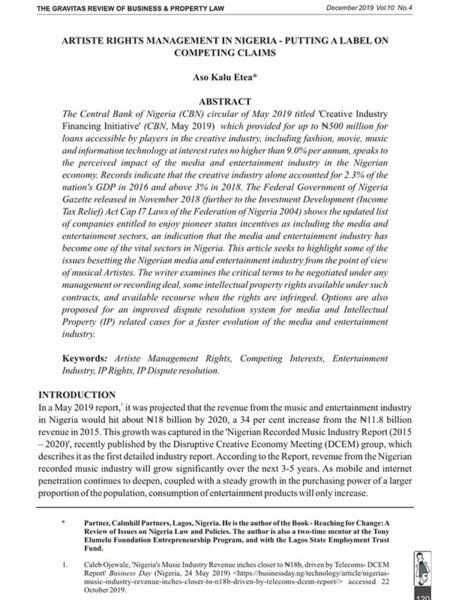
Artiste Rights Management in Nigeria – Putting A Label on Competing Claims
0₦2,500.00Aso Etea, Partner, Calmhill Partners, Lagos Nigeria in his article, Artiste Rights Management in Nigeria – Putting A Label on Competing Claims, reflects on the state of, and issues besetting, the creative industry in Nigeria. He graphically depicts ‘the making and breaking of careers’ of some artistes and what they ought to have done better. Aso examines the critical terms to be negotiated under any management or recording deal, intellectual property rights available under such contracts, and available recourse when the rights are infringed. He proposes an improved dispute resolution system for media and Intellectual Property (IP) related cases for faster evolution of the industry.
The Gravitas Review of Business & Property Law



